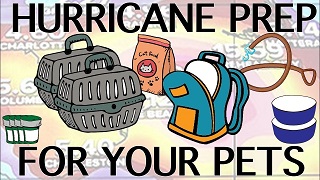

We hope that a hurricane never crosses your path; however, in the event it might, it’s always best to be prepared for not only the human members of your family, but the furry ones too.
IF YOU HAVE AN EMERGENCY, CALL 911 or 311 for help!
(We are a small group and will not be able to help you or take in animals)
Be sure to have an Emergency Pet Evacuation Kit:
-Sturdy leashes, harnesses and carriers to transport pets safely
and ensure they can’t escape (write your pet’s name, your name
and contact info on the carrier as well)
-Food, water, bowls, cat litter/pan, manual can opener for canned food
-Medications and copy of medical records in a waterproof container
-Pet First Aid Kit (your vet can help with this)
-Current photos of your pets in case they do get lost
-Info on feeding schedules, medical conditions, behavior issues
and contact info for your vet in case you have to foster
or board your pets
-Pet beds and toys, if easily transported
-Disposable bags for waste clean-up/disposal
Keep a Rescue Alert Sticker on an easily visible window so rescue workers know how many and what type of pets are in the home, should all of you need rescuing. If you have to evacuate and take your pets with you, try to write EVACUATED over this sticker, if time permits (safety first).
Know which hotels and motels along your evacuation route will accept pets in an emergency. (Call ahead for reservations if you know you might have to evacuate/ask if no pet policies can be waived)
Service animals are allowed at Red Cross Shelters, but not regular pets for health/safety concerns.
Prepare a list of friends, relatives, boarding facilities, vet offices, etc. who can care for your pets in an emergency. Be sure to include all contact info.
Be sure your pets are current on vaccines, are microchipped (confirm your contact info is current and that of your emergency contact) and your pets have secure collars with up to date identification info on them.
Keep a Weather Radio tuned and follow alerts about your area. Download the FEMA app to receive weather alerts from the National Weather Service.
If you stay at home during an event, be sure the room is an interior room with no or very few windows, remove any toxic chemical or plants and close off areas where scared animals could get stuck (like vents or under heavy furniture).
Be sure to keep your pets indoors at the first sign or warning of a storm or a disaster. Pets can become disoriented and wander away from home in a crisis. (We know someone who left their pet on a screened porch during a bad thunderstorm and was never seen again)
Evacuation and Shelter Info: https://www.floridadisaster.org/planprepare/disability/evacuations-and-shelters/
Florida Hurricane Guide: https://www.floridadisaster.org/planprepare/florida-hurricane-guide/
After the storm has passed:
Be sure to check fences and gates before letting your pets outside as these may have become damaged.
Clear your yard and surrounding areas of any debris that may cause harm.
Keep an eye on your pet’s behavior, they may be disoriented with all the scents and sounds that have changed around them. Visit the vet if necessary.
If the area has been flooded, check your home and yard for wild animals who may have sought refuge there.
AKC Emergency Pet Plan: https://www.akcreunite.org/wp-content/uploads/2013/08/AKC-Reunite-Pet-Emergency-Guide.pdf?goal=0_c81c781201-9190bd51a7-153327218
These links have more info as well as info on birds, reptiles, horses, livestock etc. in the event of an emergency:
https://www.redcross.org/get-help/how-to-prepare-for-emergencies/pet-disaster-preparedness.html
https://www.aspca.org/pet-care/general-pet-care/disaster-preparedness
https://www.cdc.gov/features/petsanddisasters/index.html
https://www.humanesociety.org/resources/make-disaster-plan-your-pets




